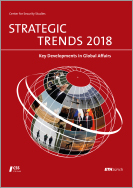Strategic Trends 2018

Key Developments in Global Affairs
Author(s): John Thompson, Brian Carlson, Severin Fischer, Tim Prior
Editor(s): Oliver Thränert, Martin Zapfe
Series Editor(s): Andreas Wenger
Series: Strategic Trends
Publisher(s): Center for Security Studies (CSS), ETH Zurich
Publication Year: 2018
Publication Place: Zurich
